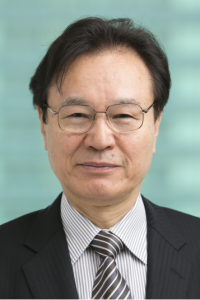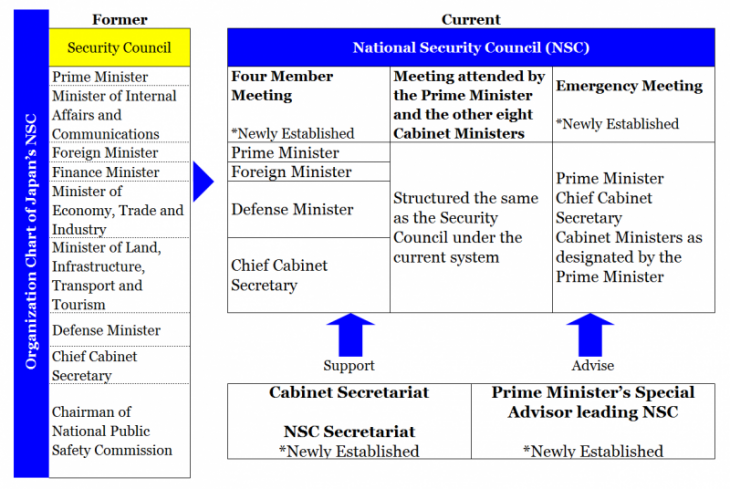“More Proactive Contribution to Peace” Changes Japan’s Diplomacy Abe Administration’s Policy Toward Asia and the United States

YACHI Shotaro, National Security Advisor to the Cabinet (Secretary General of National Security Secretariat)
The Japan-U.S. Security Consultative Committee (also known as the “two-plus-two”) meeting was held in Tokyo in October 2013 where the two countries signed an agreement to implement another update to the Guidelines for Japan-U.S. Defense Cooperation by the end of 2014. This agreement was concluded with the aim of strengthening the bilateral defense cooperation, probably in view of China’s increasing maritime assertiveness, although China was not named specifically in the agreement. It also coincides with the Obama administration’s “rebalancing” toward Asia. While the strained diplomatic relationships with China and Republic of Korea (ROK) do not seem to be getting any better at the moment, the Abe administration has embarked on a multilateral strategic diplomacy centered on the Japan-U.S. alliance which is expected to serve as a strategic move for the administration’s foreign policy.
Abe Administration’s Agenda
The Abe Administration was inaugurated in December 2012, and it was believed to have embodied the nation’s general expectation for economic recovery and governmental stability over the long term.
Such an expectation seems to have been the result of recent events that have made people feel as if Japan was being somewhat overwhelmed diplomatically by its neighboring countries with this uneasy feeling being prevalent among the general public at the time. For example, China has been showing an increasingly assertive and aggressive stance regarding the Senkaku Islands, while ROK’s President Lee Myung-Bak set foot on Takeshima Island in August 2011, which was the first time in history that a ROK’s president did so. Regarding the Northern Territories, it was also the first time for a president and a prime minister of Russia to go to Kunashiri when Dmitry Medvedev landed on the island. Against the backdrop of such controversial visits by neighboring countries’ leaders to the Japanese territories, people seem to have begun feeling that Japan was being taken advantage of by its weakening national strength and status on the whole in the international community. There is no question that for Japan to turn the tables in the aforementioned situation marked by diplomatic challenges, the best solution, after all, would be to further enhance its national strength. People also seem to have realized the importance of having to reverse the pronounced downward economic trend experienced for quite some time in Japan. Often referred to as “Japan’s Lost Decade,” (or sometimes also referred to as “The Lost Two Decades”), there is a common understanding that the economy will inevitably serve as an essential element to regain the country’s national strength. This seems to have largely contributed to forming a national consensus in favor of prioritizing an economic recovery, among other issues.
With respect to the expected governmental stability over the long term, the current administration will probably go along without undergoing any major national elections over the next three years at least, as the ruling party won the House of Councilors’ Election of July 2013 which has resolved the issue of divided control of the upper and lower houses in the Diet. For now, that seems to provide some assurance as a basis for governmental stability over the long term.
Reenergizing the Economy
First of all, let me touch upon the issue of reviving the economy. I believe we are just beginning to see some light at the end of the tunnel regarding the overall economy on the strength of the “Three Arrows” featured by Prime Minister Abe’s economic stimulus package, as well as the success in winning the bid to host the 2020 Tokyo Olympic Games, which, in particular, has brought a positive atmosphere to Japanese society.
Secondly, the Abe Administration was expected to exercise its strong political leadership on such issues as participation in the TPP (Trans-Pacific Partnership) talks and the relocation of Futenma U.S. air base, among others. Despite strong opposition on the domestic front, Prime Minister Abe decided to participate in the TPP talks as well as to relocate Futenma U.S. air base to Henoko, northern Okinawa, even before the upper house election was held in July 2013. The Prime Minister’s executive decision at the time was made based on his strong belief that these two issues should not be left unaddressed in light of national interest.
Thirdly, I would like to elaborate on the issue of the Consumption Tax hike. In light of the nation’s dire fiscal state, the Abe administration has decided to raise the consumption tax rate to 8% in April 2014 with a strong belief that this will serve as a revenue enhancement option better than anything else even allowing for its general unpopular nature. His decision also embraces the agreement previously reached among the three parties (i.e. Liberal Democratic Party, Democratic Party of Japan, and New Komeito Party) on the comprehensive reform of social security and tax.
The fourth issue is related to the TPP talks. Currently, a global economic power shift is being accelerated by the growth in Asia and it is important for Japan to take advantage of the economic dynamism of Asia in an aggressive manner, as well as to promote Japan’s market access for foreign imports or vice versa. Prime Minister Abe is also on the same page concerning this matter.
Another important perspective regarding the TPP talks is that the United States’ “return” to Asia is becoming increasingly evident. This implies that the United States will be focused more on its commitment to Asia not only in the fields of security affairs and politics, but also concerning the region’s economic facets. For the two reasons just mentioned above, Japan’s participation in the TPP talks is quite necessary, and it is very important for Japan to make as much achievement as possible in its favor through negotiations.
National Security and Establishment of a Japanese Version of NSC
Regarding security affairs, the Upper House is currently debating the bill to establish a National Security Council (NSC) and I understand the ruling party aims to pass the bill by the end of November 2013. Simply put, an NSC will serve as a central control tower in the Japanese Government for implementing its foreign policy and defense initiative. With the prime minister serving as the chair, the NSC will be comprised of the chief cabinet secretary, foreign minister, defense minister, and deputy prime minister, if applicable, (currently, Deputy Prime Minister and Finance Minister Aso Taro). With the four cabinet ministers (plus deputy prime minister currently on board), the NSC will determine fundamental direction for foreign and defense policies concerning national security. Concurrently, the National Security Secretariat (NSS) shall be established in the Cabinet Secretariat to take charge of the drafting and analysis of matters concerning national security while supporting and coordinating administrative work as required by the NSC. According to press reports, the National Security Secretariat will be launched with sixty members.
The Japanese version of NSC has been modeled after two existing examples, i.e. the NSC of the United States, and that of the United Kingdom, which was established in 2010. Out of these two examples, the U.K. version of the NSC may serve as a model rather suitable for Japan because of its similarity to the United Kingdom’s political system, i.e. a parliamentary cabinet system, as opposed to the presidential government system adopted by the United States. The secretary general of Japan’s National Security Secretariat will always be in close contact with appropriate counterparts in respective allied countries such as Susan E. Rice, National Security Advisor of the United States, and Sir Kim Darroch, National Security Advisor of the United Kingdom.
When I served as Assistant Chief Cabinet Secretary the Iraq War broke out. As I recall, national security advisors from the United States, United Kingdom, Germany and France were sharing and exchanging views and intelligence through a video conference almost every day. In my capacity as Assistant Chief Cabinet Secretary of Japan, I requested to join the discussions but I was given the diplomatic brush-off insinuating that my position was not high enough to qualify for joining the loop. In retrospect, I believe their blunt reaction in turning down my request was attributable to their common ulterior motive toward Japan which I did not realize at the time. Be that as it may, I believe the establishment of a national security advisory body like the NSC will make it possible for Japan to increase its commitment to similar intelligence-sharing opportunities going forward.
Drafting of a National Security Strategy
A plan is currently underway to create Japan’s national security strategy for the first time in its history. This endeavor is designed to create overarching guidelines for Japan’s foreign and security policies from a long-term standpoint. Keen discussions and deliberations are being made at the Council on Security and Defense Capabilities in which I serve as one of the discussion members.
The Council’s main tone-setting policy is represented by the idea of “Proactive Contribution to Peace” on international cooperation, as advocated by Prime Minister Abe during the Diet session. I think his ambition could also be paraphrased as a “Proactive Contribution to Peace.” While its underlying nuance is communicable, the literal translation “active pacifism” carries a connotation that is different from the original meaning, which is close to “Proactive Contribution to Peace” in English.
What I would like to emphasize here is that the term “Proactive Contribution to Peace” really explains Japan’s strong determination to contribute to the peace and stability of the world in a proactive manner, which denies the opposing idea of “one-country pacifism” embraced previously. In general, the position of pacifism is that there is no problem as long as peace is secured only for Japan, with no commitment made to any international conflict or anything else of that nature while seeking happiness for itself alone by trying to avoid any possible involvement in any of those events. However, Japan is strongly committed to the peace and stability of the world in a proactive manner, specifically through peacekeeping operations (PKO), international peace cooperation activities, or more broadly official development assistance (ODA), and enhancing human security.
A National Security Strategy will serve as an overarching platform under which the National Defense Program Guidelines will be set out. The 2011 National Defense Program Guidelines as hammered out under the administration of the Democratic Party of Japan focused on a dynamic defense concept and strengthening defense capabilities in the southern island chain. We will be updating the 2011 Guidelines so that they match the latest circumstances surrounding Japan. Concurrently, we will embark on revising the guidelines in conformity with the National Security Strategy. Following the revision of Japan’s defense guidelines, we will update the Guidelines for Japan-U.S. Defense Cooperation which is scheduled for completion by the end of 2014, as agreed at the Japan-U.S. Security Consultative Committee (also known as “two-plus-two”) meeting held in October 2013.
Here is another point that is worth mentioning, i.e. a change in the interpretation of the collective self-defense concept. While the government’s constitutional interpretation regarding collective self-defense has traditionally been such that Japan possesses the right of collective self-defense but is not allowed to exercise it, we basically aim to change the current interpretation in order to make the right of collective self-defense exercisable for Japan as a sovereign state.
Global Trend in Perspective
As I mentioned earlier, economic power has been shifting from the West to the entire area of Asia. Asia has grown to represent around half of the world’s population, with its Gross Domestic Product (GDP) also expected to account for nearly 50% of the world. Looking back in history, in 1750, which was the year just before the Industrial Revolution started, Asia accounted for about half of the world’s economy and population. This means that the situation experienced nearly 300 years ago is taking place again today.
Japan Aims for Revival
According to The Economist: The World in 2050, the world’s GDP for the period from 2011 through 2050 is expected to show 3.7% annual growth on average, while Japan’s GDP growth per year for the same period is expected to be only 0.9% on average, which is a surprisingly low growth rate for those who have experienced Japan’s high economic growth before. Japan’s share of the world’s GDP was 5.8% in 2010 in terms of purchasing power parity (PPP), and it is expected to drop to 1.9% in 2050. That is an image of the future of Japan. What it means is that only Japan will continue to follow a long-term downtrend in its economy, while the rest of Asia will show high growth, as suggested by the analysis of The Economist magazine published before the Abe Administration was inaugurated. I believe that Japan must commit itself to reversing the challenging situation that experts are forecasting.
The Advent of an Asia-Pacific Era and China’s Rise
When it comes to referring to the advent of an Asia-Pacific Era, it goes without saying that it would be quite important for us to keep a close watch on China’s rise and its increasing maritime presence. Since his inauguration, Chinese President Xi Jinping has been repeatedly emphasizing that achieving the Chinese Dream of a “great rejuvenation” of the Chinese nation was his government’s main objective. It seems that he tries to achieve this objective through a policy of enhancing the wealth and military strength of the country, as well as expanding its maritime presence. Faced with many domestic problems that need to be addressed, the Chinese government seems to find no other effective choice but to rely on an unadulterated appeal to nationalist sentiment for achieving continued robust economic growth.
It is believed that the concept of the great rejuvenation of the Chinese nation represents the country’s rise in recent years to have become the world’s second largest economy with rapid military build-up after experiencing the history of humiliation following the First Opium War, which helps to produce elation among the Chinese people who used to find themselves as the center of the world in ancient times. It seem that the nation’s elated aspiration for economic prosperity and enhanced presence in the global arena is destined to grow further.
“Centripetal” and “Centrifugal” Forces of the Chinese Communist Party
While its economy continues to prosper, the Chinese communist government under a single-party regime no longer finds itself equipped with centripetal or unifying forces backed by ideologies such as Marxism-Leninism, Socialism, or Maoism that used to be commonly mentioned in the political statements made by the government before. Instead, economic prosperity currently serves as the most powerful centripetal force for the government to unify the nation.
According to sources, the employment rate of college graduates in China is currently around 40%, which suggests that the Chinese people in general still share an optimistic view that the serious job search of today may pay off tomorrow, and tomorrow life may be better than today. This is where the Chinese government’s centripetal forces come into play. Conversely, in the event of a slowdown in economic growth to just 1–2% per year, the Chinese government will probably find it politically very tough to maintain the effectiveness of economy-oriented centripetal forces.
On the contrary, China is plagued by quite a few problems that serve as “centrifugal” forces for the government, and one of the most pressing issues is the increasing income disparity that is developing on a large scale between different geographical areas as well as different groups of citizens, i.e. inland areas versus coastal areas, urban areas versus rural area, rich versus poor within the same urban area, and so on. The income gap in China is incomparably more serious than that in Japan and the income gap in China appears to be widening further.
Another issue confronting the Chinese government is corrupt local administrations and other political wrongdoings, which in part fuel 180,000–250,000 cases of protests and riots taking place each year across the nation. Extremely violent lobbying, appeals and other extreme activities of this nature are everyday occurrences in China these days.
One other thing is the ethnic minorities issue which also serves as a centrifugal force for China. Among others, Tibet and Xinjiang Uighur present pressing problems for the Chinese government.
The Continental State Aims for Naval Expansion
China is essentially a continental state that has historically tended to protect its national security through territorial expansion. It seems that China is aspiring to an increased naval presence as well by applying the same expansionist logic as it embraced for expanding its territory before. China’s expansionist logic based on its nature as a continental state is represented in such arguments as claiming its historical rights over the South China Sea and justifying control over the First and Second Island Chains, along with even proposing to divide up the Pacific Ocean into the U.S. and Chinese spheres of influence. Against such a backdrop, I believe Japan should, as a maritime nation, actively encourage China’s constructive engagement in intensified anti-piracy efforts as well as in maintaining freedom of navigation on the seas, in conformity with international maritime rules and practices.
China has caused maritime disputes with sovereign states in the South China Sea basin including the Philippines and Vietnam. While China’s prosperity and its increased national strength seem to be the focus of global attention, it is undeniable that China’s aggressive maritime assertiveness in the region is creating negative repercussions in the international community.
Meanwhile, a Conference on Diplomacy with Neighboring Countries was held in late October 2013 where President Xi Jinping made important remarks. Simply put, his speech was meant to represent a good-neighbor policy full of amicable words. In response to that, I would like to suggest the Japanese government send a message to the Chinese leadership to the effect that Japan certainly hopes China will practice the amicable diplomacy as mentioned in the speech made by President Xi Jinping, rather than displaying cynicism with reluctance to take his speech seriously because it was full of pretty words. I believe it would be quite important for Japan to have more diplomatic dialogues while trying to seize good opportunities to do so.
A Shift in Power between the United States and China
The next point is related to a shift or a transition in power between the United States and China, i.e. is it really likely to happen? To answer this question we need to think about what China lacks critically and fundamentally for it to make the power transition happen. Apparently, China does not seem to embrace universal principles and ideals that justify its role as world leader. We also know that a state system as practiced by the government of China will not serve as a centripetal force attracting broad support from the rest of the world. It is quite obvious that there is no other county that would wish to become a state like China, which is unfortunate to the government of China. A country like China can never be a world leader for a lack of universal values embraced within its system. Not to mention that the international community or any society or business organization would need management leadership with a strong grip on its members or employees for sustained success and future growth. Therefore, China itself must hold up a torch of guidance that could be embraced universally in order for it to become a world leader replacing the United States. Otherwise, there seems to be absolutely no chance for China to facilitate a power shift from the United States in the global arena.
Abe Administration’s Foreign Policy
The Abe administration’s diplomacy, which is often referred to in Japanese as “a diplomacy taking a panoramic perspective of the world map or the globe,” is hard to translate into English. If I were to translate this into English I would say, “Diplomacy of a bird’s eye view of the globe.” For us Japanese, its nuance in Japanese could be communicated rather more easily than it would be when translated into English. Prime Minister Abe’s diplomacy is based on the principles of “Proactive Contribution to Peace” that I have discussed earlier.
Emphasis on Universal Values
In view of the Abe Administration’s diplomacy, which takes a panoramic perspective of the globe, there seem to be three important points to note.
First, Japan is a maritime state, surrounded by the seas. Japan is a small country, which ranks probably as low as in the sixtieth range only with its territorial land considered, but it ranks sixth when gauged in terms of its coastal economic zone as well as the length of its coastline. What this means is that such things as freedom of navigation on the seas and maritime access are of vital importance to Japan.
The sea is considered one of the international public properties along with the atmosphere, outer space and cyberspace, and for this reason, international waters should be left open to any country for their free use as international public property. To that end, it will be quite important for Japan to establish solid partnerships and networks with countries such as the United States, ROK, the Philippines, Indonesia, Australia, New Zealand, India and the European nations, which share the same principles and values on maritime order. This international initiative is designed not to exclude China and Russia, but rather it is intended to encourage their engagement in joint efforts to establish a maritime environment for our future economic prosperity. Japan should promote this kind of international initiative as its national policy as there is no doubt about that.
Second, Japan’s general stance is to promote its universal values that can be shared among the international community such as freedom, human rights, democracy and rule of law, while cherishing its tradition and culture that have fostered its nationality for us to boast to the rest of the world. In view of those universal values having roots in the European Enlightenment, I believe it might be beneficial for Japan to keep close relationships with European nations that represent the birthplace for Enlightenment. In the postwar period, Japan and Europe have long tended to “take it for granted” together to some extent, sharing values and principles fostered and cherished by each other. I strongly believe that Japan must further advance its partnership with Europe by taking advantage of the mutual commitment to promote common principles and values once more under the current international environment where Japan and Europe both find themselves in a lowered position relative to the emerging economies.
The third point is related to so-called Post-modern Diplomacy, which originated in Europe. This concept has been advocated by senior British diplomat Robert Cooper in his book The Breaking of Nations. Cooper contends that Japan is the only Asian nation where a common awareness may possibly rise soon among people about the importance of promoting international partnership in the face of national boundaries and other constraints of that nature. This means that Japan is recognized as being a close partner to Europe from their perspective, despite its physical distance from Europe. I believe Japan should keep embracing such principles and values about international partnership.
Market Development
It is quite important for the Japanese government to actively provide assistance for companies that aim to acquire minerals and other natural resources or develop markets which serve as a very important part of the country’s growth strategy. Traditionally, the government has made it a rule to refrain from supporting a single business entity based on the notion that those areas of business should be developed by private enterprises themselves. Notwithstanding this, the government has made an about-face to abandon its traditional stance, and it is now actively committed to assisting companies with their global expansion in business.
The government also provides consultation for local authorities to export local products that are indigenous to their region. Such a governmental promotion initiative includes hosting an exhibition at a foreign embassy for goods and food products from a certain prefectural community, along with the promotion of dance and music that are embedded in traditional Japanese culture. I believe an active initiative to support such business activities constitutes an important part of Prime Minister Abe’s diplomacy featuring a panoramic perspective of the globe.
Abe Administration’s Major Diplomatic Agenda
Recently, Prime Minister Abe has been making strategic moves steadily in rapid succession with respect to his diplomatic agenda, which may look to some people as if he were making a strategic arrangement of the opening stones in a game of go, a Japanese traditional board game with the objective of capturing territory. Since his inauguration, Prime Minister Abe has visited as many as twenty-five countries within a short period of twelve months, with the exception of Africa and Latin America. (He has though visited Argentina in connection with the 2020 Tokyo Olympic Games.) I believe that going forward Abe will have a keen focus on Africa and Latin America along with Europe, with all of which he is willing to promote deeper relations.
Further Enhancement of the Japan-U.S. Alliance
Basically, the alliance between Japan and the United States serves as a given. The U.S. government has made it very clear that Article 5 of the Japan-U.S. Security Treaty will be set in motion in case of China’s aggression over the Senkaku Islands, along with its strong opposition voiced against China’s attempt to unilaterally change the status quo in the East China Sea. That means the Japan-U.S. alliance will serve as a deterrent of supreme importance against China. With China in mind, Japan’s defense focus is heading south to protect the Nansei Islands. Meanwhile, Japan-U.S. joint military drills have been held quite often to protect the island chain.
Moving on to a security issue between Japan and the United States, it is undeniable that there is a sense of inequality as embedded in the Security Treaty between the two countries. The United States argues that Japan has a “free ride” on defense without sacrificing their lives, which has tended to gain a strong momentum particularly at the time of tense trade friction between the two countries. Although Article 5 of the Japan-U.S. Security Treaty obligates the United States to defend Japan in case of a security emergency, Article 5 does not obligate Japan to protect the United States when it is under armed attack.
From the Japanese perspective, there is an argument that Japan has been spending far too much money for the military protection provided by the United States because no emergency situation for Japan’s security has ever occurred which sacrificed the lives of American soldiers. These Japanese frustrations are based on the fact that Japan covers the substantial costs of maintaining the U.S. military bases in the country each year, including Host Nation Budgetary Support. Meanwhile, U.S. military crimes have taken place in Japan on or near military bases and facilities provided by Japan for the United States to use.
I personally do not concur with that kind of argument because I believe that the Japan-U.S. Security Treaty and the U.S. stationary troops in Japan have actually served as a deterrent for Japan to avoid getting involved in any war. I do not think we can categorically describe Japan’s substantial cost of maintaining the U.S. bases as “overspending” while a feeling of “inequality” seems to exist among the Japanese people.
Then, what seems to be the effective solution for us to resolve the mutual distrust between the two countries? While trying to cut its defense spending substantially, the United States currently intends to maintain its military presence in the Asia-Pacific region, with 60% of its navy fleet deployed in the Pacific and 40% in the Atlantic. In this environment, the United States seems to have great expectations for defense cooperation with Japan. In other words, there seems to be much room for Japan to help enhance the United States’ deterrent power while it continues to strengthen its national security framework with the United States.
Relations with China
Let me move on to the issues surrounding the Senkaku Islands and Japan-China relations. The Japanese government has no intention of changing its stance to the effect that the Senkaku Islands are clearly an inherent part of the territory of Japan in light of historical facts and based upon international law. If changed, then China will probably claim rights over Okinawa next. Again, the Japanese government has no intention of backing off over the Senkaku Islands. Meanwhile, China looks unlikely to change its assertion over the islands. In case China takes an unreasonable attitude toward the territorial issue, Japan must take a resolute attitude to cope with that. The Senkaku Islands run the risk of easily becoming like Takeshima if we contemplate bringing this case to the International Court of Justice or the United Nations Security Council. Japan must make it clear to China that Japan will never allow China to exercise its assertion, and actually, Japan has already done so with China.
No matter how tense the assertion may become, it is clearly beneficial for Japan to avoid any armed conflict from happening with China. From a comprehensive point of view regarding Japan-China relations in the twenty-first century, we must not allow the great momentum of mutual growth to entirely disappear solely because of the disputes over the Senkaku Islands. In view of the great future potential for Japan-China relations, both countries should come up with an effective solution to control the bilateral territorial disputes in future-oriented perspectives.
Japan and China must have a high-level dialogue in view of the strained relations between the two countries. Prime Minister Abe has made it clear that his government is ready for a high-level conference without any conditions. Nevertheless, China has not responded to our offer yet. The best Abe could do is to shake hands with Chinese officials at international conferences without talks occurring. From an administrative point of view, it is still premature to hold a top-level conference with China because an awkward meeting agenda will make the strained bilateral relations even worse. In the meantime, the secretariat staff should work out strategies to win a successful outcome at a top-level conference, assuming such bilateral talks will be held soon. We should think that it is important for Japan to deal with China with “patience” backed by well-calculated “strategy.”
Relations with ROK and North Korea
Japan’s relations with ROK look somewhat similar to those with China. Disputes over Takeshima Island appear to have subsided these days. Rather, the comfort women issue currently poses a more serious problem for Japan diplomatically. Japan does not seem to have much to do to resolve this issue. Meanwhile, Korean judicial court has ordered Japanese firms to compensate Koreans conscripted into the workforce and the military during the colonial period which was supposed to have been resolved at the time of the conclusion of The Treaty on Basic Relations between Japan and the Republic of Korea in 1965. The Korean judicial court’s recent ruling is totally unacceptable as far as Japan is concerned. This issue has been resolved completely and finally under a treaty on wartime compensation and the Korean government has shared the same view with the Japanese government thus far. The recent decision made by the Korean judicial court in no way justifies any compensatory obligations for Japanese firms. Rather, this issue will be simply treated as a violation of the bilateral treaty between Japan and Korea.
However, having a disruption like that in Japan-ROK relations is anything but a good thing, particularly in view of North Korea’s nuclear buildup.
Six-Party Talks focusing on abduction and denuclearization issues with North Korea have been halted for quite some time now. North Korea even refuses to respond to Japan’s offer to hold a bilateral meeting on denuclearization. For North Korea, denuclearization seems to be an issue that they want to talk about with the United States and denuclearization has nothing to do with Japan. On the contrary, Japan is most exposed to the nuclear risk of North Korea. In that sense, North Korea’s refusal to hold bilateral talks is quite regrettable.
As far as the abduction issue is concerned, North Korea insists that the issue has been resolved. They take a stance to pretend that the abduction issue has seen some progress and they use it as a tool to set up meetings with Japan. While it is important for Japan to keep informal dialogue channels open with North Korea, the abduction issue has not seen much progress thus far, making this a very difficult problem to deal with.
Chinese diplomats share the same view with me that North Korea is the most difficult country with which to negotiate. I have often discussed with Chinese counterparts that China’s embargo on food and energy to North Korea would wrest a concession from them. In response to my assertion, the Chinese counterparts said that North Korea would not easily succumb to such pressure. Even China has limited power to exercise toward North Korea concerning its toughness as a negotiator.
Japan’s Northern Territories
Lastly, let me discuss the Northern Territories. There are pros and cons over the issue of Japan’s Northern Territories. Those who have advocated the return of the Northern Territories for years argue that all of the four islands should be returned to Japan. Some other people argue that now is not a good time for Japan to sit at the negotiating table with Russia because President Vladimir Putin seems to have no intention of making a compromise on this issue. I believe there would be almost no chance for Japan to make any progress later, and this means that Japan has no other choice but to continue negotiations with President Putin in order to work out solutions now. Putin has a six-year term as Russian president, and if he is reelected, then he will have a twelve-year term. Fortunately for Japan, Prime Minister Abe has met with President Putin four times to have very fruitful discussions.
Frankly speaking, President Putin seems to be isolated in the international arena. His relationship with the United States and Europe is not good. On the surface, Russia claims that it has a good relationship with China, but potentially, many confronting factors appear to be embedded in their “good” relations. Under these circumstances, President Putin seems to believe he has built a relatively good relationship with Prime Minister Abe, despite the bilateral disputes over the Northern Territories. I believe Japan should stay focused on the amicable personal relationship between Prime Minister Abe and President Putin and take advantage of interconnection diplomatically to move things for the better between the two countries. Putin is also known to be very good at judo and he seemed to hit it off well with former Japanese Prime Minister Mori, who is also known as a keen rugby player, a sport similar to judo in its combative nature. I believe Japan should strive to resolve the bilateral disputes over the Northern Territories through various efforts, which, going forward, will include even taking advantage of the good personal relationships between the political leaders of the two countries.
(This article is adapted from a speech given at a regular luncheon event held on 9 November 2013. The editorial department is solely responsible for the wording of the article.)
Translated from “Abe Seiken no tai-Ajia / Beikoku Gaiko (Abe Administration’s Diplomatic Strategy for Asia and U.S.),” Toa (monthly magazine East Asia), January 2014 No. 559, pp. 10-19. (Courtesy of Toa / the Kazankai Foundation) [January 2014]





